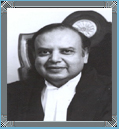 Source
Times of India
Source
Times of India
CJI faces dissent over promotion of
HC judge
Manoj Mitta
10 Aug, 2006 0025hrs ISTTIMES
NEWS NETWORK
NEW DELHI: If PM Manmohan
Singh was embroiled in the file notings controversy, Chief Justice of India
Y K Sabharwal is not without his share of problems with the Right to Information
Act.
At three consecutive meetings
of the Supreme Court collegium held to select high court chief justices,
Justice Sabharwal faced dissent triggered by an RTI application related
to a complaint of "misconduct" against acting chief justice of the Delhi
High Court, Vijender Jain.
It all began three months
ago when Justice Sabharwal proposed to the collegium, comprising himself
and the two senior-most judges of the Supreme Court, that Justice Jain
be promoted as chief justice of the Bombay High Court.
But Justice Sabharwal was
forced to change his proposal for the Bombay High Court as one of the collegium
members questioned his candidate's credentials citing a report in The Times
of India, which disclosed in April that the RTI regulator, Central Information
Commission, had sought information from the Supreme Court registry on the
complaint against Justice Jain.
Since the dissenting member
subsequently retired during the summer vacation, Justice Sabharwal revived
the proposal to promote Justice Jain, this time to head the Punjab and
Haryana High Court.
In the event, the collegium
meeting held immediately after the apex court re-opened on July 3 threw
up another dissenting voice from the reconstituted collegium.
The new member too asserted
that Justice Jain could not be considered for promotion in view of the
complaint alleging that, in violation of the judicial code of conduct,
he had decided a suit filed by somebody who had performed his granddaughter's
wedding in Justice Jain's official residence.
A fortnight later, the CJI
made his third attempt to push Justice Jain at the collegium meeting held
on July 17. The difference this time was that instead of calling just the
two senior- most judges, Justice Sabharwal convened a five-member collegium,
which is normally used for appointments to the Supreme Court.
At the instance of the dissenting
member, the CJI also consulted other SC judges who happened to be former
chief justices of the Delhi High Court. At least two of them are learnt
to have expressed reservations about the move to promote Justice Jain.
Despite such discordant notes,
Justice Sabharwal recommended Justice Jain's promotion on the strength
of majority opinion in the collegium.
The matter is now being proc-essed
by the government before it is due to be placed before the President for
him to sign the warrant of appointment.
The CJI's support for Justice
Jain is consistent with his administrative "order" in the RTI case on April
21 saying that he had "examined" the complaint against Justice Jain and
found "no merit" in it. Justice Sabharwal, however, did not give any reasons
for holding that the complaint lacked merit.
Judiciary in Dock (Justice
Vijender Kumar Jain)
Source Times of India
April 14, 2006
New Delhi: A complaint of
"misconduct" against the acting chief of Delhi High Court, Justice Vijender
Kumar Jain, has put Supreme Court in the dock under the Right to Information
(RTI) Act.
In an interface between
RTI and judicial accountability, Central Information Commission directed
Supreme Court on April 3 to disclose the status of the complaint against
Justice Jain within 15 working days.
The court's registry will
by then have to seek orders of Chief Justice of India Y K Sabharwal on
the manner in which, information about the complaint can be given in keeping
with, as the commission put it, "the decorum vital to the administration
of justice in the highest court in the land".
Ironically, both Sabharwal
and Jain have, in their own different ways, spearheaded the ongoing clean-up
in Delhi: While a Supreme Court Bench headed by Justice Sabharwal has cracked
down on shops in residential areas, a high court bench headed by Justice
Jain has ordered the demolition of illegal constructions.
Further, four days after
the commission passed the order related to the complaint against him, the
government issued a notification on April 7 appointing Justice Jain as
acting chief of the Delhi High Court.
Though the commission's
order does not name Justice Jain and simply says that the complaint is
against "a judge of the Delhi High Court", TOI discovered his identity
by accessing the records of the commission.

Justice Vijender Kumar Jain
The complaint, which has
not been made public, alleges that Justice Jain, violating norms set for
judges, decided a suit filed by
somebody with whom he had
"family relations".
The proof it cites of the
alleged connection is a wedding card, which shows that the litigant, Hari
Ram, performed the marriage of his granddaughter in April 2001 in what
was then the official residence of Justice Jain: 12, Ashoka Road.
According to the complaint,
Justice Jain, sitting singly, went on to conduct proceedings between October
and December 2001 in Hari Ram's suit. Three years later, sitting in a two
judge bench, Jain dealt with an appeal in the same matter and decided it
in November 2004 in fervor of Hari Ram.
It was in such circumstances
that, in January 2005, a member of the party that lost the case, Sub hash
Chandra Agrawal, complained against Justice Jain to then chief justice
of India R C Lahoti.
Justice Jain, when contacted,
declined to comment, saying he was not aware of the complaint at all. Agrawal
too refused to talk to Times of India saying he was awaiting CJFs response
to the commission's direction on his complaint.
The commission came into
the picture as Agrawal, a businessman from the walled city of Delhi, invoked
RTI Act in October
2005 to find out the status
of his complaint. Following his application under RTI Act, the public information
officer of the Supreme Court informed Agrawal in November that the complaint
had been "kept on record in the relevant high court file". Agrawal again
drew a blank, when he filed the first appeal, as provided in RTI Act, before
a superior officer in the Supreme Court registry.
Subsequently, Agrawal filed
the second appeal before Central Information Commission, which is an independent
appellate body set up under RTI Act.
On February 7, a Bench of
the commission consisting of Wajahat Habibullah and Padma Bala-subramanian
held that the Supreme Court registry's reply to Agrawal was "clouded in
obscurity, as it did not indicate the manner of accessing the information
(on the status of the complaint) nor the form of redress that the appellant
might seek".
Going back to the commission
within a fortnight, the Supreme Court registry clarified that Agrawal's
complaint had actually not been sent to the Delhi High Court as the apex
court had "no administrative jurisdiction" over high court judges.
Therefore, whenever it received
any such complaint, the registry can only place it before the chief justice
of India and "thereafter it has no access to or information about the complaint".
Since the registry disclosed
that the complaint against Justice Jain was still pending in the office
of the chief justice of India, the commission passed its latest order on
April 3 putting the onus on Justice Sabharwal to find a way within 15 working
days of balancing the citizen's right to information with the "decorum"
of the administration of justice.
Source Times
of India April 14, 2006 Page 14 |



